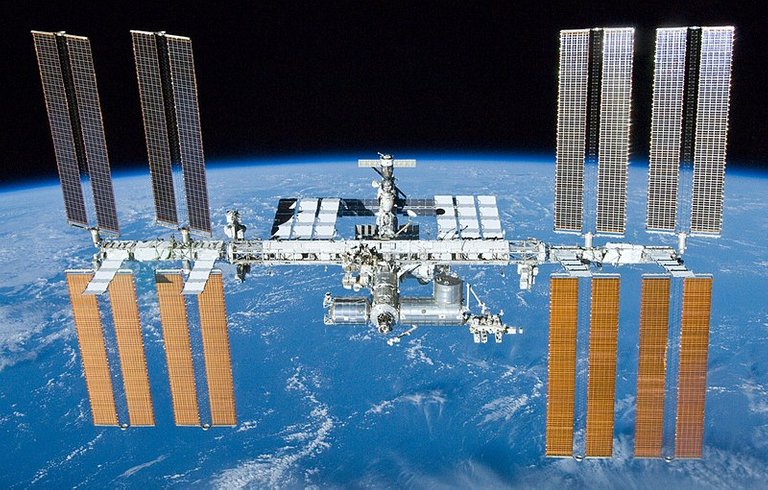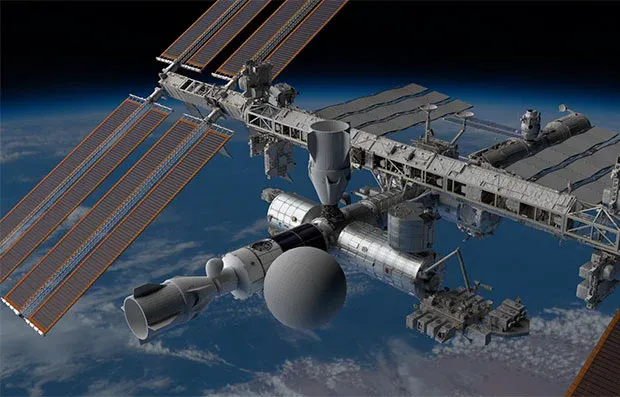
ISS. Source: Wikimedia. Public Domain
Politics on Earth affect Space (and some of us think that "and vice versa" applies here). Recently, the words of Garret Reisman, former NASA astrounaut, about a possible conflict in Ukraine triggered all the alarms: "It scares me that if this becomes a shooting war, I think it would be hard for the ISS to survive"
The International Space Station is a laboratory in space environment that is permanently crewed in Low Earth Orbit around orbiting 400 km above the Earth surface. It is a reference of International collaboration in between NASA (US), Roscosmos (Russia), JAXA (Japan), ESA (Europe) and CSA (Canada) and the inclusion of Russia in the project in the 1990s marked what was seen as the start of a new era of collaboration in space projects.
Its ownership is stablished by the ISS Intergovernmental Agreement and the Memorandum of Understanding in between the all the involved parts. Each member holds responsibility and ownership of their own modules.
The operation of the ISS is generally divided in between the US Orbital Segment (USOS) and the Russian Orbital Segment (ROS), that is why, in the recent days, concerns have been raised related to a possible separation of both orbital segments.
It is not possible to separate the ISS in two
Russia has been threatening with leaving the ISS in the past, with a mix of allegations of it being and old infrastructure risking the life of his cosmonauts and following the sanctions to its space industry after the annexation of Crimea.
However, a separation in two of the Space Station is practically not possible as it has been strongly argued, since the two segments are deeply dependant of each other.
The control and command capabilities are replicated in both orbital segments, however there are two main heavy interdependencies: Power and Orbit control.
The Russian modules provide the necessary thrust to keep such a big artificial satellite flying so low in orbit. Without this re-boosting, the space station would re-enter into the atmosphere quickly. However, the attitude (orientation) of the station is controlled by the US Segment Gyroscopes.
The power is supplied to the Russian modules via the American to Russian Conversion Unit, that converts the 124V DC US power into 28V DC of the Russian modules. Because the Russian modules, despite of having the possibility of attaching a solar tower, they have never been installed one. And, pairing with the previous problem, the propulsive module without proper power would be useless.
Of course the different Agencies could try to find solutions to these lack of resources. We could think of the ROS using their propulsion module for attitude control, and the USOS relying on the Cygnus resupplying spacecraft as an orbital raising propeller. Using the Cygnus for this purpose would not be a novelty since it has been done in the past, but funny enough, the Antares rocket used to send this resupply module uses rocket engines that are Russian made. This is how much interconnected the ISS supply chain is.
If they decide to keep the stations together but with the hatch closed, the station would face other problems. Vozdukh CO2 scrubber and the Elektron oxygen generator in the ROS are [aging](Vozdukh CO2 scrubber, the Elektron oxygen generator ) and not so reliable anymore, so in the hypothetical case of -let's imagine- there station remains together but the hatch is closed, the two Orbital Segments could not rely on the other life support system for redundancy.
Which are the plans for the future of the ISS?
It is not the first time the ISS is used as leverage. We were saying before that Russia indicated they would not extend the life of the ISS later that 2024 after the imposition of Crimea sanctions, but in that moment they were the only crew transportation system to orbit. Now that the US has he Crew Dragon, situation may have changed a bit.
In the past months we got to knew anyway that the project would finish in 2030, with a controlled deorbit of the spacecraft over the Pacific Ocean.. Until then, NASA had the intention of reinforcing the commercial operation of LEO assets. The company Axiom space is taking the leading role and will provide missions to the ISS commercially commercially operated under a NASA contract and had plans to install a habitable module attached to the ISS.
A "fun" part of this commercialization of space is the plan to install a cinema studio on-board. Space Entertainment Enterprise (SEE) is co-producing a Tom Cruise movie that will have scenes shot in space. The module is being built by Axiom space -usual suspect- and is expected to be in orbit in 2024. But hey, it won't be the first film with scenes shot in space, after a Russian crew of professional filmmakers including Klim Shipenko and actor Yulia Peresild did it in October 2021.
Plans of NASA to continue having Space stations will pass after 2030 through substituting the ISS with privately operated stations. Nanoracks, Blue Origin and Northrop are competing with the new designs. @jorgebgt gave some insights in one of his posts.
On the meantime, China has its space station operative, and some countries like Russia are thinking about sending their cosmonauts there . We could debate if this opens a new era of two competing poles of collaboration in space. From LEO the next objective is the Moon, and we can already anticipate how China is leading the International Lunar Research Station with Russiaon their side while US is trying to approach the countries to its Artermis Accords and a new Moon Orbiting station.
Maintaining continuous human presence in space
I was starting claiming that politics in Earth will continue affecting space exploration. We will see how situations that can be more or less cumbersome or even critical. However, we have seen how big research endeavours require cooperation that transcends punctual conflicts and how the research communities tend to cooperate more than their countries, creating wellbeing, wealth and knowledge in benefit of all of us.
And in this specific topic, the huge variety of projects in the future landscape makes me think that we have proved the use for a continuous presence in space, so we will continue seeing countries collaborating in different space stations to keep getting all the benefits of having a laboratory up there.
What do you think? Is it the end of idealist internationalism in Space? Are you also desperate to see how the future space stations would look like?

The rewards earned on this comment will go directly to the person sharing the post on Twitter as long as they are registered with @poshtoken. Sign up at https://hiveposh.com.
This post has been manually curated by @bhattg from Indiaunited community. Join us on our Discord Server.
Do you know that you can earn a passive income by delegating to @indiaunited. We share 100 % of the curation rewards with the delegators.
Here are some handy links for delegations: 100HP, 250HP, 500HP, 1000HP.
Read our latest announcement post to get more information.
Please contribute to the community by upvoting this comment and posts made by @indiaunited.
Yay! 🤗
Your content has been boosted with Ecency Points, by @metabs.
Use Ecency daily to boost your growth on platform!
Support Ecency
Vote for new Proposal
Delegate HP and earn more
This is an interesting question. I like to think that if Russia leaves, then the other agencies will find a way to continue the project no matter what. Today at least, I have the impression that they have options. Now, what will actually happen is another story...
Uhm... I think we cannot call this just a crisis anymore. I agree, there are technical solutions for both sides to continue using even a station that splits in two. However both parts need some time to put new modules and that takes time (see for how long the launch of Naukas has been postponed). So, who knows, in a very confrontational situation maybe we would see an early end of the station, but we could also see the ISS as a coperation forum that remains open even in that situation. Next days will say I guess.
Things have indeed terribly evolved last night... I always hope that science can move away from any political considerations to push the frontiers of knowledge forward... However, in the present situation this is very unlikely to happen. Too many past indicators pointing in the wrong direction...
You may be interested in reading this that I just found out. That's straight on the topic.
Cheers and have a nice week-end!
Thanks @lemouth for the reference, as expected in this situation, space cooperation initiatives are going to suffer and be involved in the current escalation. I am going to try to compile the current situation and put something together.
Excellent. I am looking forward to read it.
Thanks for your contribution to the STEMsocial community. Feel free to join us on discord to get to know the rest of us!
Please consider delegating to the @stemsocial account (85% of the curation rewards are returned).
You may also include @stemsocial as a beneficiary of the rewards of this post to get a stronger support.
Congratulations @metabs! You have completed the following achievement on the Hive blockchain and have been rewarded with new badge(s):
Your next target is to reach 2250 upvotes.
You can view your badges on your board and compare yourself to others in the Ranking
If you no longer want to receive notifications, reply to this comment with the word
STOPCheck out the last post from @hivebuzz:
Support the HiveBuzz project. Vote for our proposal!
That is an interesting thought process. This is really scary. Politics have always gotten in the way of scientific progress. We see how certain internal conflicts actually take place in different sectors. I just hope though that "big research endeavors would actually cooperate and transcends punctual conflicts more than their countries, creating wellbeing, wealth, and knowledge for the benefit of all of us."